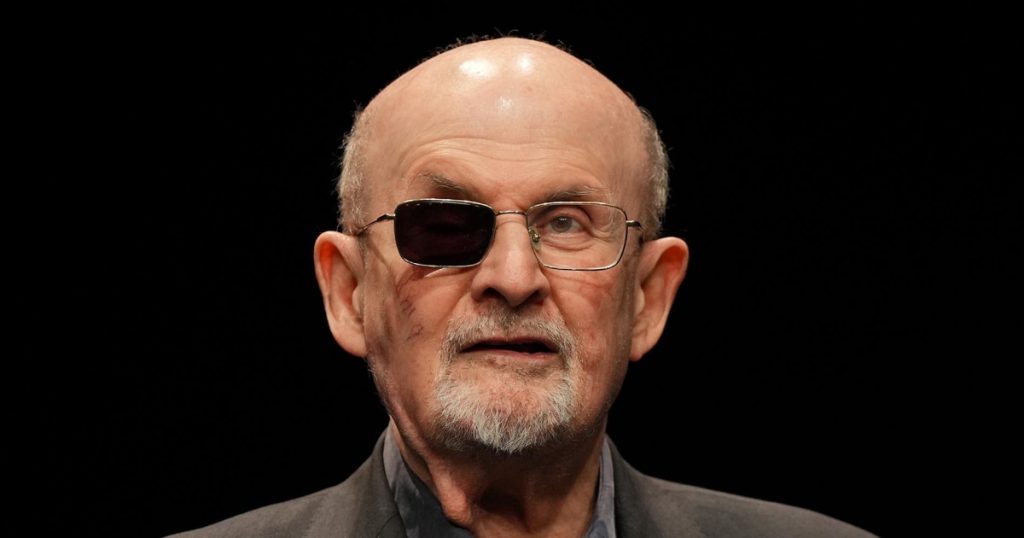The Day of the Attack: A Graphic Account
Salman Rushdie, the renowned author of works like Midnight’s Children and The Satanic Verses, recounted in vivid detail the harrowing moments of the 2022 attack during his testimony in the trial of Hadi Matar, the 27-year-old man accused of stabbing him. On that fateful day, Rushdie was on stage at the Chautauqua Institution in western New York, preparing to deliver a lecture on the importance of protecting writers. Suddenly, a masked figure, later identified as Matar, rushed toward him with a 10-inch knife and repeatedly slashed him. Rushdie described the overwhelming pain and shock he felt as he lay in a pool of his own blood, fearing that his life was slipping away. He credited the quick actions of those who subdued his attacker with saving his life.
The Emotional Toll of the Attack
Rushdie’s testimony painted a vivid picture of the sheer terror and chaos of the moment. He recalled seeing his attacker’s dark, ferocious eyes and initially mistaking the knife for a fist. The reality of the situation dawned on him as blood began pouring onto his clothes. “I saw a large quantity of blood pouring onto my clothes,” he said. “He was hitting me repeatedly. Hitting and slashing.” The attack left Rushdie with severe injuries, including vision loss in one eye, and a long, grueling recovery process. As he recounted these events, Rushdie’s wife, Rachel Eliza Griffiths, wept in the courtroom, highlighting the emotional weight of the experience for those closest to him.
The Road to Recovery
The aftermath of the attack was just as daunting as the event itself. Rushdie spent 17 days in a Pennsylvania hospital and over three weeks in a New York City rehabilitation center, where he had to relearn basic tasks, such as squeezing toothpaste from a tube. Even now, he estimates that he has only recovered about 75 to 80% of his former self, acknowledging that he is less energetic and physically weaker than before. Despite his resilience, the attack has left a lasting impact on his life and well-being. Rushdie’s testimony provided a stark reminder of the fragility of life and the enduring effects of such a traumatic event.
The Trial and the Defense’s Strategy
During the trial, Hadi Matar sat just 20 feet away from Rushdie, often looking down as the author recounted the attack. Matar has pleaded not guilty to charges of attempted murder and assault. His public defender, Lynn Schaffer, conducted a brief cross-examination, starting with light-hearted questions about Rushdie’s career. She even revealed that her favorite movie was Bridget Jones’s Diary, in which Rushdie makes a cameo. Rushdie humorously replied that it might be his “most important work.” However, Schaffer also hinted at a potential defense strategy by asking whether trauma could affect memory. Rushdie acknowledged that he had at least one false memory of the attack—believing he had stood up to face his attacker when, in fact, he had not. Schaffer then challenged him to recall the exact number of times he was struck, to which Rushdie replied, “I wasn’t counting at the time. I was otherwise occupied.”
The Broader Context of the Attack
While the prosecution has made it clear that the case is not about mistaken identity—“This is not a case of mistaken identity,” District Attorney Jason Schmidt stated during opening arguments—the defense has argued that the case is more complex than it seems. Schaffer emphasized that the elements of the crime require more than just acknowledging that “something really bad happened.” Federal authorities have also alleged that Matar was motivated by a 2006 endorsement of the fatwa issued against Rushdie by Ayatollah Ruhollah Khomeini in 1989, following the publication of The Satanic Verses. This fatwa, which called for Rushdie’s death, forced the author into hiding for years. However, the state trial is focused on the immediate facts of the attack rather than its broader ideological motivations.
Looking Ahead
The trial is expected to last up to two weeks, with further proceedings on federal terrorism charges to follow. As the case unfolds, it raises important questions about free speech, violence, and the long shadow of the fatwa that has haunted Rushdie for decades. While Rushdie’s testimony marked a significant moment in the trial, it also served as a poignant reminder of the enduring impact of that fateful day. The world continues to watch as justice is sought for a crime that shocked not only Rushdie’s loved ones but also the global literary community.












